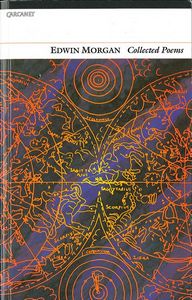Edwin Morgan 'catches in full sight' in his lyric epiphanies, in the focus and refocus of sequences, the wily reification of words in concrete poems, the weird rhythms of sound poems. His transforming imagination is democratic, generous and inclusive. Even the sonnet form becomes a new experiment for a poet of questing and anarchic vision, unwilling to rest on rules. 'More than the work of most poets,' writes Iain Crichton Smith, Morgan's poetry 'welcomes the twentieth century, with its gadgets, its paradoxes, graffiti, new languages, torn advertisements, unconscious jokes, voyages...' This volume includes Poems of Thirty Years, Themes on a Variation, and some fifty uncollected poems from 1939 to 1982.
<br>
| LoC Classification |
PR6063.O69A17 1996 |
| Dewey |
821/.914 |
| Edition |
Pbk. ed. |
| Nationality |
British |
| Pub Place |
London |
| Cover Price |
$39.96 |
| No. of Pages |
608 |
| Height x Width |
8.5
x
5.2
inch |
|
|
|
|
Professor Edwin Morgan (born April 27, 1920) is a Scottish poet and translator who is associated with the Scottish Renaissance. He is widely recognised as one of the foremost Scottish poets of the 20th century. In 1999, Morgan was made the first Glasgow Poet Laureate. In 2004, he was named as the first Scottish national poet: The Scots Makar.
Glasgow and grew up in Rutherglen. He entered the University of Glasgow in 1937 and, after interrupting his studies to serve in World War II in the Royal Army Medical Corps.his six year service in the Middle East with the Royal Army Medical Corps.,
Called up in 1940, he registered first as a Conscientious Objector and then enlisted in the Royal Army Medical Corps, spending the war as a Quartermaster's clerk with the 42nd General Hospital in Egypt, the Lebanon and Palestine. Supplied with books by friends back home Morgan was on overseas service when he first read Medieval Scots verse whose lasting impact was to be constructive.
His sonnet "North Africa" mentions many of his poet friends whom he knew in the war
Demobilised in 1946, graduated in 1947 and became a lecturer at the university. He worked at Glasgow University until his retirement in 1980.
He came out as a gay man in Nothing Not Giving Messages: Reflections on his Work and Life (edited by Hamish Whyte), Polygon, 1990. He had written many famous love poems, like "Strawberries" and "The Unspoken", in which the love object was not gendered; this was partly because of legal problems at the time but also out of a desire to universalise them
regarding his translation of beowolf he said. ""This translation of Beowulf was made in the last years of the 1940s and was published in hardback by the Hand and Flower Press in 1952. In the present Carcanet edition, poem and introduction have been kept the same despite temptations to tinker here and there. The translation which was begun shortly after I came out of the army at the end of the Second World War, was in a sense my unwritten war poem, and I would not want to alter the expression I gave to its themes of conflict and danger, voyaging and displacement, loyalty and loss. Inter arma musae tacent, but they are not sleeping."
